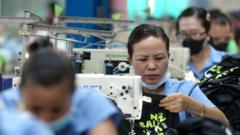Step into any vibrant mall in Singapore, and the enticing aroma of freshly baked goods often fills the air. Long lines gather at the counters of Korean, Japanese, and Taiwanese bakeries, where patrons eagerly choose from a diverse array of cream rolls, milk breads, and delicately filled croissants. Among these establishments, Paris Baguette stands out with its name hinting at French origins while showcasing its 100% Korean identity.
Jin-soo Hur, the CEO of SPC Group, which owns Paris Baguette, asserts the need to reinterpret culinary boundaries. “Our brand isn’t limited to French bread. We’re an international brand; croissants can be universal,” states Hur. From humble beginnings in a family bakery 80 years ago, SPC has blossomed into a major player in South Korea’s bakery scene, reporting impressive sales of $5.6 billion last year.
In 1988, Paris Baguette made waves as the first Korean bakery brand to open an international store in China, a market where its presence continues to flourish. With a current total of 4,000 outlets in 14 countries across regions including Asia, Europe, and North America, the brand has set ambitious international expansion goals, targeting the establishment of over 1,000 new branches by 2030—many of them in the U.S.
Paris Baguette is banking on the American market for its growth strategy, investing in a new factory in Texas that will be its largest facility outside Korea when operational in 2027—essential for supplying fresh pastries to the U.S., Canada, and Latin America.
To enhance its visibility, the brand has partnered with Tottenham Hotspur, an English Premier League football club. “Food is culture; sports create vibrant atmospheres which positively engage communities,” explains Hur. The beloved captain of South Korea's national football team, Son Heung-min, helps amplify the bakery’s profile in the country.
The revolution in baking methods is also significant. By utilizing a system for distributing frozen dough to franchises, Paris Baguette maintains efficiency and food quality across its global outlets. Despite this, concerns linger about whether mass-produced items can yield artisanal quality. Chef Saveria Busato from the Culinary Institute of America conducted a tasting experiment that pointed out significant textural differences between traditional and frozen dough products.
As Paris Baguette adapts to a changing market characterized by cost-of-living challenges and inflation, Hur acknowledges the need for innovation to thrive outside Korea. Competitors face struggles as well, and while some may pivot to subscription models, Paris Baguette remains focused on not just profits but on evolving global bread culture: “We’re committed to opening more bakeries. It benefits our country and our customers,” Hur proclaims, reflecting an unwavering belief in the power of food to unite and enrich lives worldwide.






















